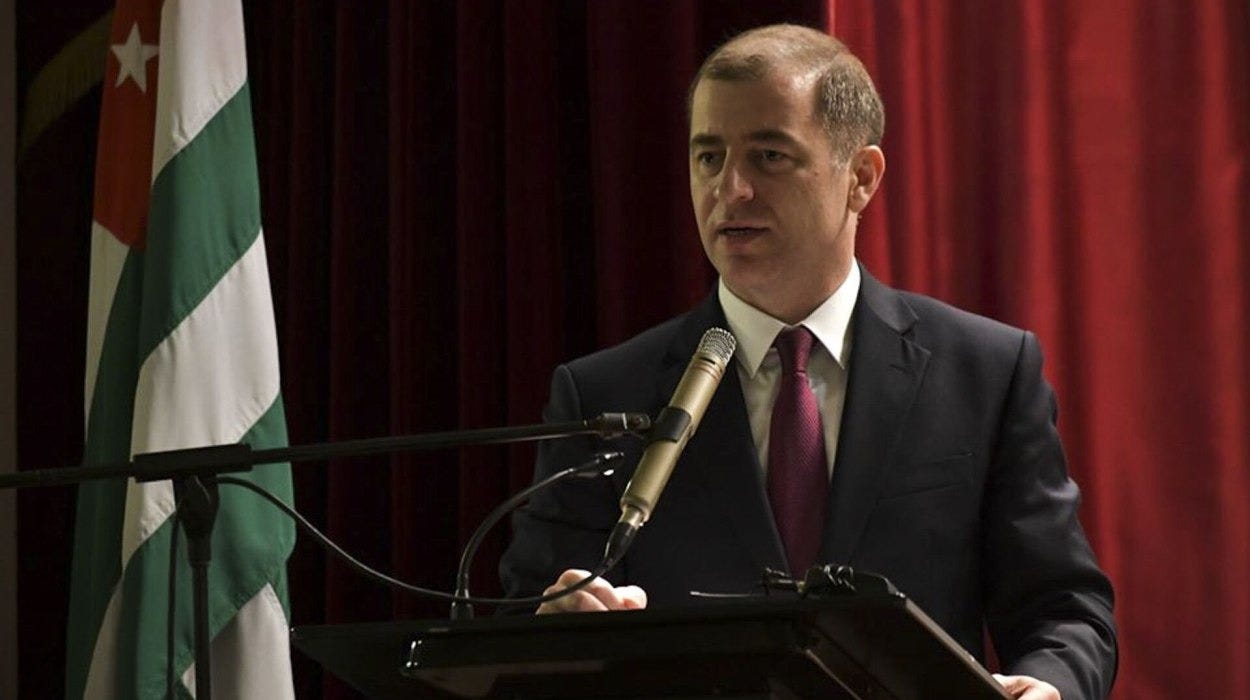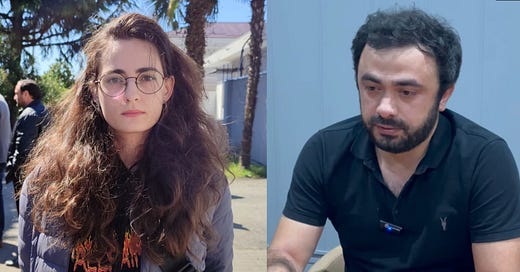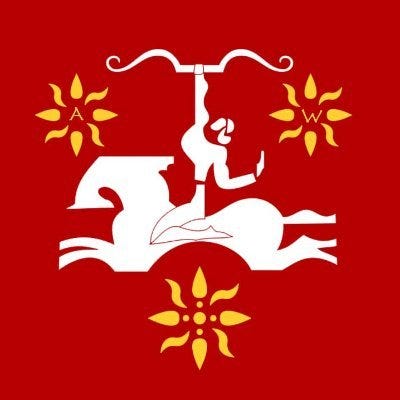The Week: Crackdown on Civil Liberties, Spy Theories, and the President's Candid Admission
Translated from Russian, this article by Izida Chania from "Nuzhnaya Gazeta" discusses recent Abkhazian politics, including assaults on activists and tensions leading up to the 2025 elections.

The main focus this week was the assault on journalist David Gobechiya and Lia Agrba, an activist from the youth movement ҲараҲПицунда (KharaKhPitsunda - Our Pitsunda). To recap, on 15 September, masked individuals attacked the young people during a picnic, using pepper spray. The lack of interest from the republic’s leadership in investigating this crime became immediately apparent: the police took a long time to respond to the call (claiming investigators couldn’t find the address), and then the prosecutor’s office and investigative bodies subjected the victims to multiple interrogations. The very next day, Interior Minister Robert Kiut stated that the victims were not giving testimony and were hiding from law enforcement. This might have been believable if there hadn’t been numerous people present in the office at the time, astonished by the incoherent actions of the investigators. Anonymous information resources, acting in tandem with law enforcement, stepped in to defend the perpetrators. They questioned the credibility of the reports about the attack and accused the young people of staging it. Neither the president himself nor his entourage or the parliament reacted to the attack.
This became yet another confirmation that the attack was sanctioned by the authorities. The public perceived the incident as pressure on young people with active civic engagement, marking another phase in the government's assault on civil liberties.
Representatives of the public, the opposition, and independent journalists demanded that the authorities conduct an investigation. They expressed their opinions in independent media, as they were denied access to state television. Meanwhile, media controlled by and sympathetic to the authorities maintained their stance and discussed spy theories about Western intelligence infiltrating Abkhazian civil society and preventing Aslan Bzhania from implementing his grand commercial projects. The spy theory was also propagated through external “experts” who called for unity around “our leader” and urged people not to hinder the implementation of the president’s projects. Numerous anonymous resources were also engaged. The topic of NGOs became their main theme of the week, portraying the administrator of the “Abkhaz Portal [Telegram channel —Ed.],” David Gobechia, and Lia Agrba—the daughter of two veterans of the Georgian-Abkhazian war—as Western emissaries.
Aslan Bzhania also promoted this narrative. After three weeks, he finally realised that his silence amidst the events unfolding in the country had overstepped all bounds of decency. On 19 August, in an interview with state television, Bzhania acknowledged that the “Kozak-Bzhania” protocol, in which he undertakes to provide lists of undesirable citizens of Abkhazia for the revocation of their Russian citizenship, is not a fake. The president refused to comment on the protocol, which, in his words, belongs to “another, albeit friendly, state.” He returned to a familiar theme—that all the country’s problems are not his fault or that of the government he appointed, but rather the fault of civil society and parliament, who do not allow him to fulfil the obligations he has undertaken.
The leader of the opposition movement ‘AND’ called Aslan Bzhania’s interview on state television deceitful. He stated this on 20 September at a press conference to which journalists from all media were invited. A telling detail: journalists from state television, state news agencies, and the news agency “Sputnik Abkhazia”—which, with uncharacteristic frankness for a foreign outlet, promotes the narrative of the guilt of the Abkhazian people—did not attend the press conference.

Adgur Ardzinba is convinced that Bzhania’s treacherous promise to provide lists of Abkhazian citizens for the revocation of Russian citizenship is explained by his resentment towards the Abkhazian people, who do not allow him to “build an authoritarian-oligarchic system.” The leader of the opposition movement ‘AND’ proposed that Aslan Bzhania, who promised openness and transparency in governance, engage in an open dialogue on state television and convince him of the benefits of the projects he is lobbying for.
But let’s return to the “crime situation.” What are the consequences of law enforcement’s inaction and their desire to cover up the crimes of “their own”? While Aslan Bzhania was giving his “interview,” a boomerang was flying over the city. It reached its target on 19 September. On that day, in the city centre, the president’s nephew, Inal Kvitsinia—who had participated in many confrontations with civil activists—was beaten. Attacks on civil activists had been carried out “by a group of persons by prior conspiracy,” involving bodyguards and even the president’s son.
The attack on Inal Kvitsinia on 19 September had all the signs of revenge. It was committed in the city centre; the attacker was without a mask, without pepper spray, and without a group of supporters. The victim, the president’s nephew, was taken to a medical facility outside Abkhazia with various bodily injuries. He did not give testimony or file a statement. A reasonable question arises: will the Ministry of Internal Affairs investigate, or will the president’s henchmen be unleashed on the attacker?
Also, this week, yet another initiative of the presidential administration to organise a “popular expression of will” in the form of letters to deputies finally failed. These letters, which people have already dubbed “letters of happiness,” were sent from the presidential administration to all districts. Employees of state institutions—teachers, doctors, cultural workers, and staff of city and district administrations—were supposed to sign demands for the adoption of the law on apartments and the provision of benefits to foreign businessmen. They were threatened with dismissal and loss of salary. However, the system that worked flawlessly in Soviet times failed: entire districts refused to sign the letters sent down from the presidential administration. The largest number of signatures was collected only in the eastern part of the country. Paradoxically, many of the signatories are not citizens of Abkhazia, did not participate in parliamentary elections, yet are appealing to deputies as their elected representatives.
Against such a backdrop, we are approaching the presidential elections of 2025.
See also: "Letters of happiness," as they've been dubbed by the public, are being distributed to schools and medical institutions. Teachers and doctors are being "strongly encouraged" to sign a letter addressed to deputies, asking them to ratify this agreement. The authorities imply that failure to do so will result in not receiving their salaries. Read on AW
If you appreciate our work and want to help us continue providing insightful content on Abkhazia, please consider making a donation to AbkhazWorld.com. Your support enables us to operate more effectively and expand our projects.
You can support our work with a one-time donation or monthly subscription.
PayPal: https://www.paypal.com/donate/?hosted_button_id=KZMKPDZHLYVDA
(you don't need to register for a PayPal account.)Buy me a coffee: https://www.buymeacoffee.com/abkhazworld
Patreon: https://www.patreon.com/AbkhazWorld
Subscribe Substack:





